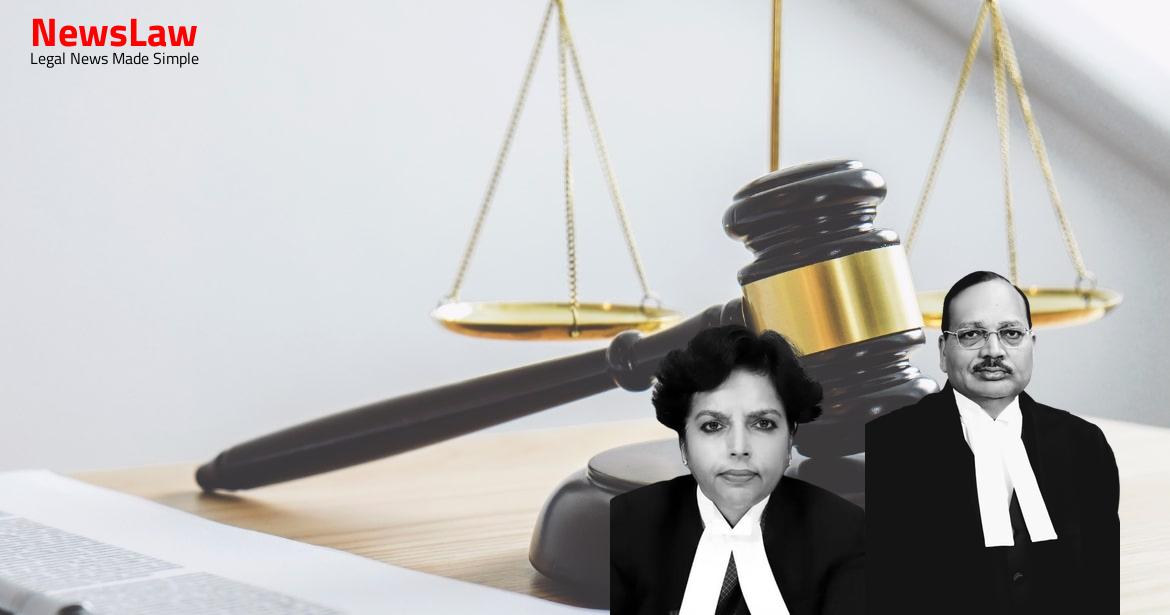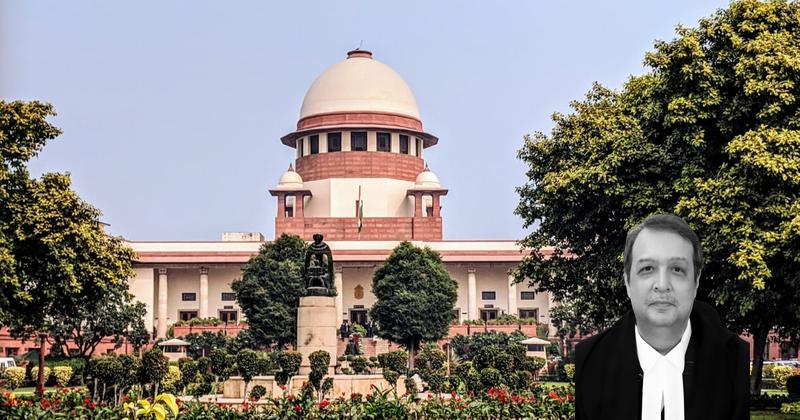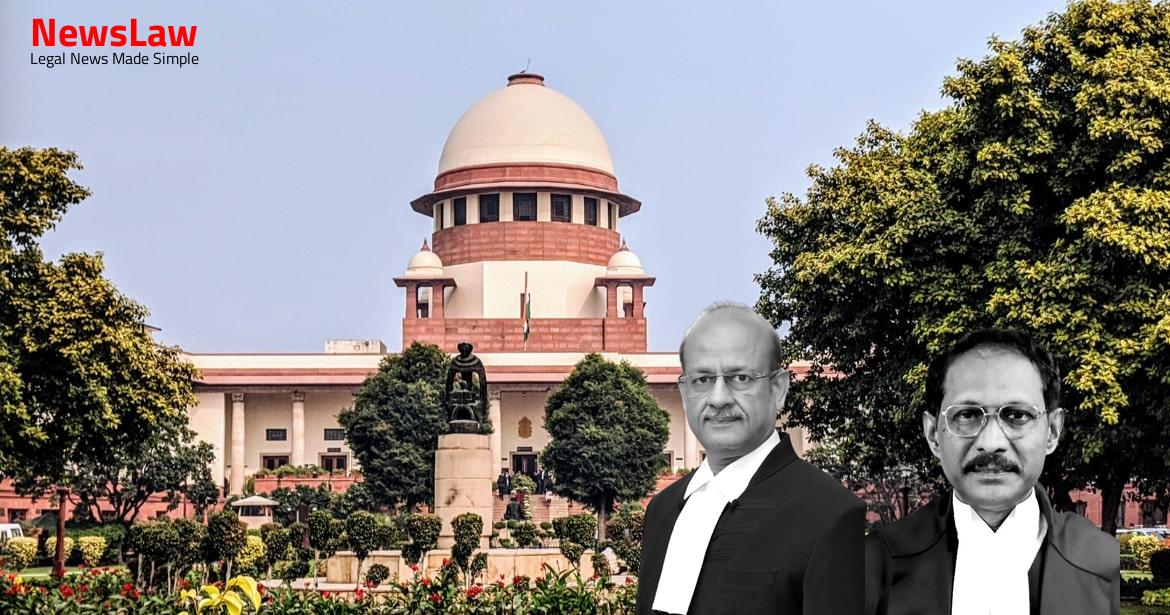Delving into the legal intricacies of using Article 142 to quash criminal proceedings for non-compoundable offences under special statutes. Highlighting the importance of ensuring complete justice while considering the nature of the offense, voluntary settlements, and equitable balancing of conflicting claims. The court’s analysis focuses on the application of statutory provisions in cases involving sensitive social issues, emphasizing the need for a nuanced approach to address the complexities of the legal system.
Facts
- The appellant and his neighbor were involved in a civil dispute over a piece of land.
- The appellant allegedly threw a brick at the complainant and made derogatory remarks about her caste.
- The complainant, belonging to the ‘Prajapati’ community, filed an FIR under the SC/ST Act.
- The appellant was convicted under the SC/ST Act and sentenced to six months rigorous imprisonment.
- The appellant appealed to the High Court, which upheld the conviction.
- The incident stemmed from a property dispute between the parties.
- The prosecution witnesses supported the complainant’s version of events and confirmed the use of derogatory language by the appellant.
- The appellant argued that the incident was due to the property dispute and not related to the complainant’s caste.
- One of the co-accused passed away during the proceedings, leaving the appeal only applicable to the appellant.
- The Trial Court convicted both accused persons for offences and sentenced them to undergo rigorous imprisonment for 6 months.
- High Court upheld the order of conviction and sentence against the Appellant.
- Appellant approached this Court after being aggrieved.
- High Court found sufficient evidence to establish that the Complainant, a member of Scheduled Caste community, was humiliated by the Appellant with specific reference to her caste and intent to insult her.
- Appellant and co-accused actions were held to be in contravention of Section 3(1)(x) of the SC/ST Act read with Section 34 I.P.C.
Also Read: Analysis of Suppression of Information in Employment Selection: Legal Perspective
Issue
- Two questions are considered in the present appeal.
- The first question is whether the jurisdiction of the Court under Article 142 can be used to quash criminal proceedings for a non-compoundable offence.
- The second question is whether the power to quash proceedings can be applied to offences under special statutes like the SC/ST Act.
Also Read: Analysis of Cheating and Forgery in Passport Case
Arguments
- Reference made to a previous court decision in Hitesh Verma v. The State of Uttarakhand & Anr.
- The court held that a property dispute between a vulnerable group and a person of a higher caste does not constitute an offense under the SC/ST Act unless it is based on caste discrimination.
- Petitioner’s counsel invoked Article 142 of the Constitution to request the quashing of the criminal proceedings.
- Both parties expressed a desire to settle the dispute amicably for continued harmonious relationships.
- The complainant’s counsel also supported the compromise and stated that there is no existing enmity between the parties.
- Learned Counsel for the Respondent State opposed the compromise without denying its existence.
- Counsel cited the cases of Ram Lal & Anr v. State of J&K, Surendra Nath Mohanty & Anr v. State of Orissa, and Bankat & Anr v. State of Maharashtra to support the argument that the settlement between parties is inconsequential due to the non-compoundable nature of the offence.
- It was argued that since the offence is not compoundable under Section 320 of the Cr.P.C., the settlement does not hold significance.
- Concurrent finding of conviction and absence of substantial question of law were highlighted as reasons to discount the settlement in the present appeal.
Also Read: Discrepancy in Date of Birth: Court’s Legal Analysis
Analysis
- Courts must exercise caution when dealing with offences under special statutes such as the SC/ST Act.
- Powers under Article 142 or Section 482 Cr.P.C. can only be used post-conviction when an appeal is pending.
- Legal proceedings must be pending for the Court to consider interference in the case.
- Settlements should not incentivize hollow agreements between accused and victim, but aim for genuine resolutions.
- Court’s powers under Article 142 are wide-reaching but cannot be exercised in a vacuum.
- Compulsion or force in settlements will lead to no relief for the accused party.
- Annulment of proceedings based on a settlement post all legal remedies is impermissible.
- The Court invoked Article 142 to quash criminal proceedings in the interest of complete justice.
- The SC/ST Act aims to deter caste-based insults and harassment against marginalized communities.
- Courts must consider the specific facts and circumstances of each case when applying the SC/ST Act.
- Existence of a pre-existing civil dispute was a significant factor in the case.
- Section 320 Cr.P.C. does not restrict the Court’s inherent powers under Article 142 or Section 482 Cr.P.C.
- Court can quash proceedings if the offence is primarily private or civil in nature, or if continuing the legal process would be an abuse.
- The appellant was charged and convicted under the unamended Section 3(1)(x) of the SC/ST Act.
- Courts must ensure that complainant-victim entered into the compromise willingly and not due to coercion.
- Members of Scheduled Caste and Scheduled Tribe are more susceptible to coercion and must be protected.
- The Supreme Court, under its jurisdiction granted by Article 142, has the power to make orders necessary for complete justice between parties in a pending matter.
- The SC recognizes the atrocities faced by Scheduled Castes/Scheduled Tribes at the hands of upper-castes, despite various measures being taken.
- The Act protecting SC/ST members is in line with constitutional safeguards of Articles 15, 17, and 21.
- The Court’s jurisdiction under Article 142 includes plenary powers to ensure complete justice.
- While the Court can’t disregard statutory provisions, it can balance equities between conflicting claims by ironing out creases.
- Exercising powers under Article 142 must consider the nature of the offence, seriousness, voluntary nature of compromise, and accused’s conduct.
- Settlements for non-heinous or private nature offences can lead to quashing of proceedings at any stage.
- Guidelines for exercising powers under Article 142 involve doing complete justice, examining post-conviction settlements carefully, and being wary of unethical attempts to quash criminal proceedings.
- The Appellant and the Complainant lived in adjoining houses, indicating a close proximity between them.
- The incident occurred in 1994, with no subsequent untoward incidents reported.
- The Complainant willingly entered into a compromise and wants to drop the criminal proceedings.
- The nature of the offence does not display extreme mental depravity on the part of the Appellant.
- The Appellant, while not belonging to the same caste as the Complainant, is from a relatively weaker socio-economic background.
- The occurrence is deemed more private in nature with subtle criminal elements, despite falling under a special statute like the SC/ST Act.
Decision
- Bail bonds, if any, are discharged.
- The appeal is allowed in above terms.
Case Title: RAMAWATAR Vs. THE STATE OF MADHYA PRADESH (2021 INSC 664)
Case Number: Crl.A. No.-001393-001393 / 2011



